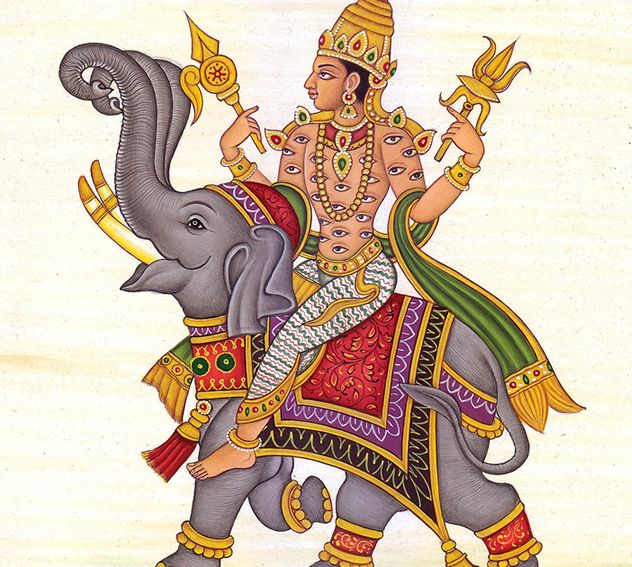Indra the word itself is limited. Indra means the ones who control the indriyas.
I won't disrespect Indra but he is one of the mini god employed by Sri Krushna. Indra is not a person , it is a post based on Karma just like the CM/PM post after few years/kalpas, that Indra will be gone and next one comes, just like Brahma and Rudra........All are bound by Karmic bondage called 'Karma Bandhanam' in sanskrit.
Maha bali has imprisoned everyone even the Indra but how his yagnas fulfilled as direct Maha Vishnu came begging ? Has anyone wondered....He did not worship the Indra/Agni/Varuna in the Yagnas, he knows by the grace of his guru Shukracharya that the inner controller of everyone is Srimannarayana........This is called 'Aparyavasana vritti' in Sampradayam.,one does not think he is a body and not indriyas, not manas, not buddhi , Jiva itself is controlled by Srimannarayana, so whatever is done it is done for the ultimate benefactor Srimannarayana only.
Sri Krushna BhagawadGita is the essence of what Vedas said, as some other poster pointed out they cannot differ in any sense.
Sri Krushna is the only supreme. Worship of any other mini god gives only partial results that wash away with time, father can only be one and that is nArayaNa.......In this context I will post a little bit info on the power of 'nArayaNa mantram' and why the known acharyas won't offer any mantram other than 'Astakshari'.
In the katha upanishad, Yama Dharma Raja wonders why so many people are visiting his place when one if chants 'nArayaNa' imagining Maha Vishnu even once , he will never enter NARAKA!
Astakshari Maha mantram is the entire essence of Vedas. It is given by Narayana to Nara at Badrinath where the Narayana appeared in 2 forms, one is Nara and the other Narayana, one taking the position of acharya and the second is shishya, it is said the power of Astakshari when received from a proper acharya lineage comes from Badrinath due to chanting by Nara-Narayana.
naarayaNa , 'ra' is agnibheejam and which can destroy the sins when uttered. 'ra' means something that is destructible('nas' in sanskrit actually means going into a state where we cannot see it ) 'na+ra' is something which is not at all destroyed. 'n'+'aa' +ra means groups of groups of entire things in the universe. Nothing is destroyed in the universe, only it changes form and name. 'Ayana' is the supporter. So naarayaNa means the ones who is inside and outside everything and supports them as a whole. In everything it exists. Narayana and Vishnu are the same as Sriyapathi is called Narayana and Narayana tattvam is Vishnu.
.nArayaNa is the most powerful word in the entire sanskrit and vedic literature...Many of the pandits tried to interpret it differently or tried to improve it and say it differently but failed because the way the nArayaNa word is formed there cannot be any syntax violations..If they give the meaning something differently, the grammatical syntax fails.
A word becomes a mantra when the 'Ommm' and 'Namaha' words are appended as prefix and suffix. Namaha can come in middle too
For example :
The rAma word although very powerful does not come close to nArayaNa because rAma just explains about one attribute of paramaatma..The ability to make others happy(ramaNam), the rAma mantram is called avyapaka mantram
Mantrams fall into 2 categories,
1. Vyapaka mantram (which explain vyapti or the spread of tattvam) which are most powerful as these explain how that supreme has spread, this is most important thing as only if the supreme is spread everywhere we can be assured that it protects anyone from anywhere, god is not someone who sits in heaven/hell and passes judgements unlike other religions...Beauty of Sanatana Dharma
2. Avyapaka mantrams(which are formed basis on the work, guna or attribute, or due to aakaram(form))
Vyapaka mantrams are only 3 in the entire vedic literature
Om vishnave namaha
Om Namo bhagavathe vasudevaya
Om namo Narayanaaya
Out of these 3, om vishnave namaha explains the supreme brahma is present in everything but does not explain what it does by being in everything, same with vasudeva, vasudeva explains that which is spread and \which illuminates...also for these mantrams when they are born or seen by some rishi they appeared as 'vishnu' or 'vasudeva' and om and namaha had to be appended. But narayana mantram appears directly with om and namaha in the middle. That makes the mantram more powerful in terms of sabdham (sound) and also artham (meaning)
nArayAna mantram explains why the tattvam has spread in all things, what it does by spreading, how it does that and it is the complete complete mantram.
There is much indepth meaning for the word nArayaNa, we have to visit dravida vedantam for the indepth meaning of the word nArayaNa given by Pillai Lokacharya Swamy while explain astadasa rahasyas
Its called Tirumantram.
i am a sinner of the highest sort (paapaatma)
adiyen Ramanuja Daasa
adiyen Chinna Jeeyar Swamy Daasa

